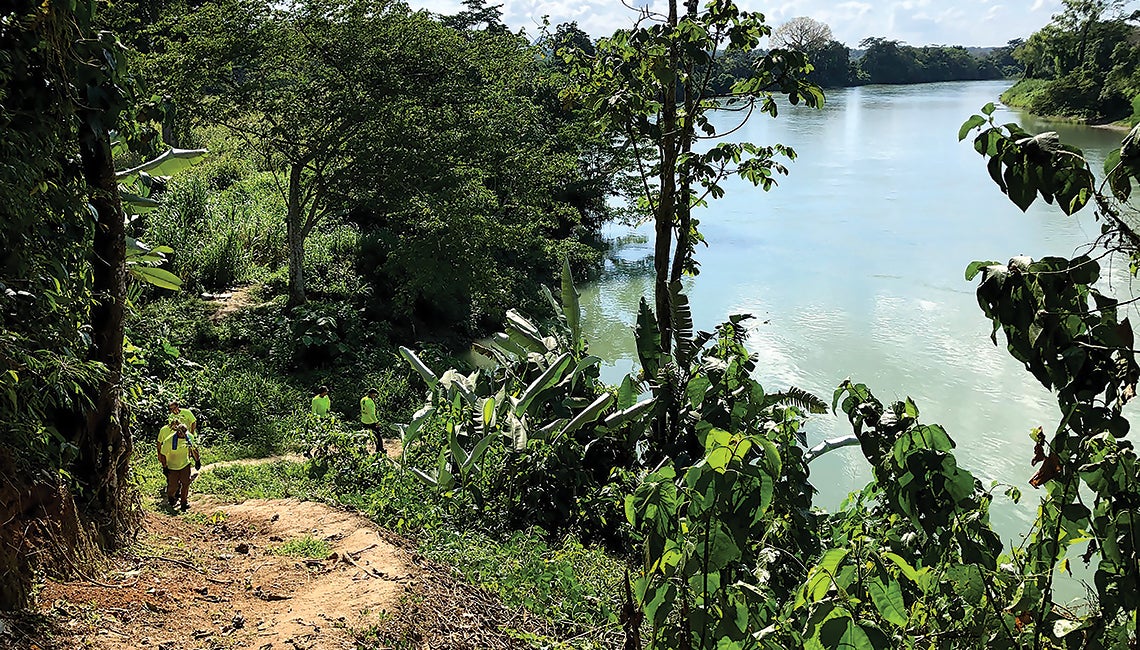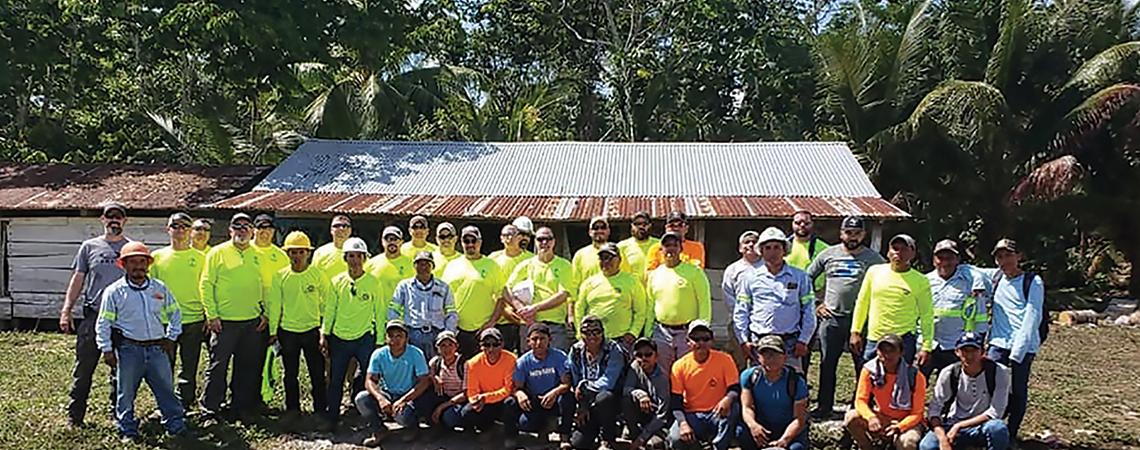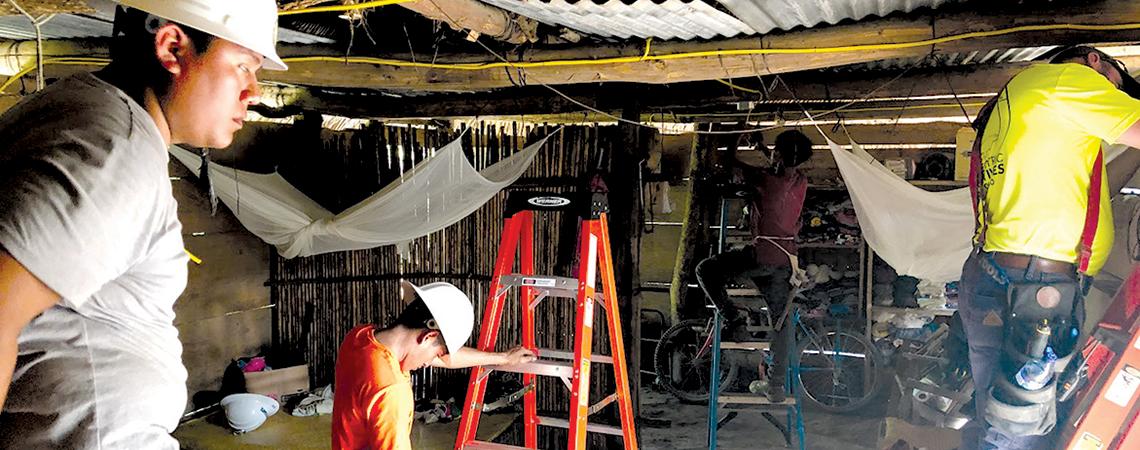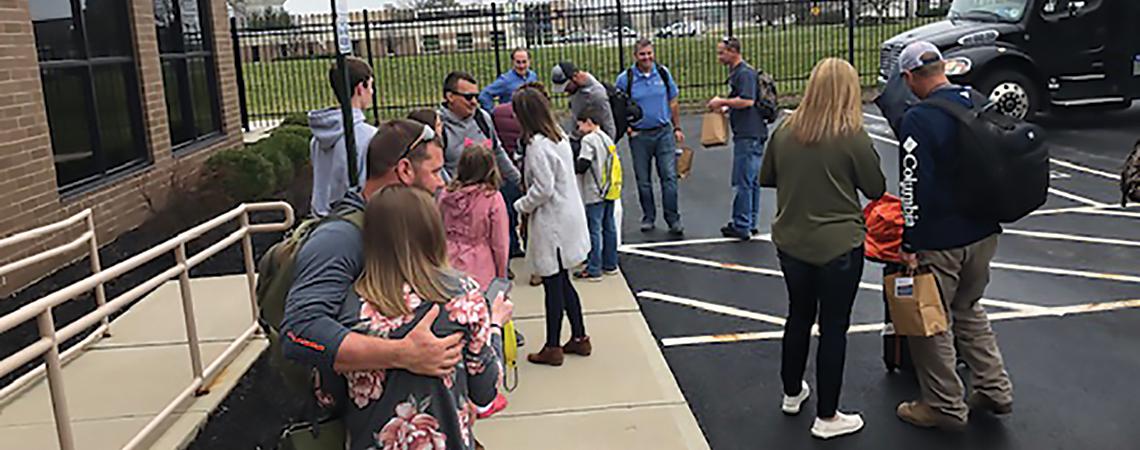Gathering a group of 16 linemen from across Ohio, leaving the security of home and family, and going to a remote part of Central America could never be considered a routine endeavor.
This, however, was the third time Ohio’s electric cooperatives collaborated with the National Rural Electric Cooperative Association (NRECA) International on a Project Ohio mission to Guatemala, and this group took with it the lessons of the previous trips. So the guys were feeling a sense of confidence, along with determination, as they set out to provide electricity for the first time to the 650 or so residents of Tierra Blanca Sebol, a tiny village in the mountainous northern region of the country.
During the extensive planning and even on the day they left, the coronavirus was distant news, barely registering as a concern. The crew was much more worried about the logistics of the work: how the wire, transformers, equipment, and tools would get to the village, as well as the water filtration systems, shoes, and other gifts made possible by donations from co-op employees around the state.
Ohio electric cooperative linemen, their counterparts from the local utility, and a group of student lineworkers from a nearby trade school electrified the village of Tierra Blanca Sebol, Guatemala, in March, just as the coronavirus pandemic swept the globe.
The day after they arrived in Guatemala, the team decided to make an impromptu stop in the village to check out the landscape of the job — to see the 67 homes and the school and get a look at the conditions they’d encounter.
As it turns out, the stop was critical. “What we found was that everything was all ready for us,” says Kyle Hoffman, the project leader and principal instructor at the training facility where most Ohio co-op linemen get their training. “We knew we weren’t going to have to go in search of tools, ladders, and supplies, so we were able to make a plan to jump right in. It felt like we had an entire day’s head start.”
Instead of taking a day or even two to gather supplies and do prep work, the team started actual work that first morning in the village. They hung nearly 3 miles of wire from poles that had been set in the ground by EMRE (the local electric company that partnered on the project) and wired the buildings with receptacles and light sockets. “I walked around after a day or two and saw every single group was ahead of schedule,” Hoffman says. “I even got it in the back of my mind I might be able to give the guys a day off to go sightseeing.”
The same day they started to work, the first COVID-19 cases were reported in Ohio. It didn’t make a huge impression right away, but the situation in those first few days evolved with lightning speed, and before long, the news from home began filtering through the team: high school tournament games first played with no fans in attendance, then postponed, then canceled; restaurants shutting down for everything but carryout; colleges sending students home for online classes for the rest of the semester. “We could tell it was getting very real, very fast,” Hoffman says. “As for us, we were probably in one of the safest places in the world, but all these guys had family back home they needed to be thinking about, and it was tough.”
They picked up the pace. Rather than sightseeing, they were now hoping for an earlier departure date.
“We were as much as three or four days ahead of schedule,” Hoffman says. “There wasn’t much we could do about the situation other than keep doing our jobs, so that was what we did.”
As the overhead crew ran the conductor across the poles, another crew hung meters and did the outside work to get each house ready; the rough-in crew went to every house to mount the boxes for the switches, outlets, and panels; and the wiring crews followed right behind them, connecting everything together.
“We were really the first ones in each house, so we got to interact with all of those families and children, and it was a good reminder of why we were there,” says Mason Shoemaker, a lineman who works at Bellefontaine-based Logan County Electric Cooperative. “We were changing lives, giving them a better quality of life and more opportunities than they ever could have without electricity. We felt like superheroes.”
Thanks to the head start and the increased sense of urgency, the team finished about 98% of their work just a week in. They were about four days ahead of schedule and figured they’d be able to flip the switch by nightfall on their seventh day.
But then the calls started coming in fast and furious — from families, from the NRECA: Guatemala had closed its borders. No one would be able to enter or leave the country for at least the next 15 days.
“We got word that they were pulling us out, and we needed to get to Guatemala City by midnight in order to be able to leave,” Hoffman says. “We had just a couple of hours to button everything up, make sure it was all safe for the local guys to energize the lines, and say our goodbyes.”
After those last inspections, the team gave out the water purifiers and some other gifts they’d brought — additional provisions were supposed to have been bought in-country, but there was no time — then loaded up their caravan and pulled out. They were in Guatemala City eight hours later, just before midnight.
There, however, they hit a roadblock. It was no small feat to get the team out of Guatemala. They had permission neither to leave the country nor to land in the U.S. once they did get off the ground. With borders closed, Ohio’s Electric Cooperatives and the NRECA had to call in the diplomatic strength of the federal government. Senators Rob Portman and Sherrod Brown and representatives Bill Johnson, Troy Balderson, Bob Gibbs, and Bob Latta alerted the U.S. State Department to open diplomatic channels. Finally, the go-ahead came just after lunchtime the next day. The linemen wasted no time getting on a chartered flight to Miami, and after another long night, they arrived back in Ohio March 19, three days earlier than originally planned.
“The guys from EMRE energized the lines the morning after we pulled out,” Shoemaker says. “It was kind of a bummer, because it would have been great to see the lights turned on, but to be honest, it’s the same thing that happens when we work a storm back home. We don’t always get to see the results of the work, but we know we did an important job. Besides, a lot of us had been in the houses, and we were able to see that appreciation from every single family we met. It was a good feeling.”
Even for the overhead crews, who, because of the decision not to rotate job duties, didn’t get to meet all of the families, the job was intensely satisfying. “I didn’t go down there looking for gratitude,” says Lee Broadman, a lineman at Hancock-Wood Electric Cooperative in North Baltimore.
“Actually, it’s just the opposite. From the day we first walked through the village and saw how the folks live and what they live on, I couldn’t help but to feel even more grateful for everything that I have. I was honored to be able to help improve their lives.”












